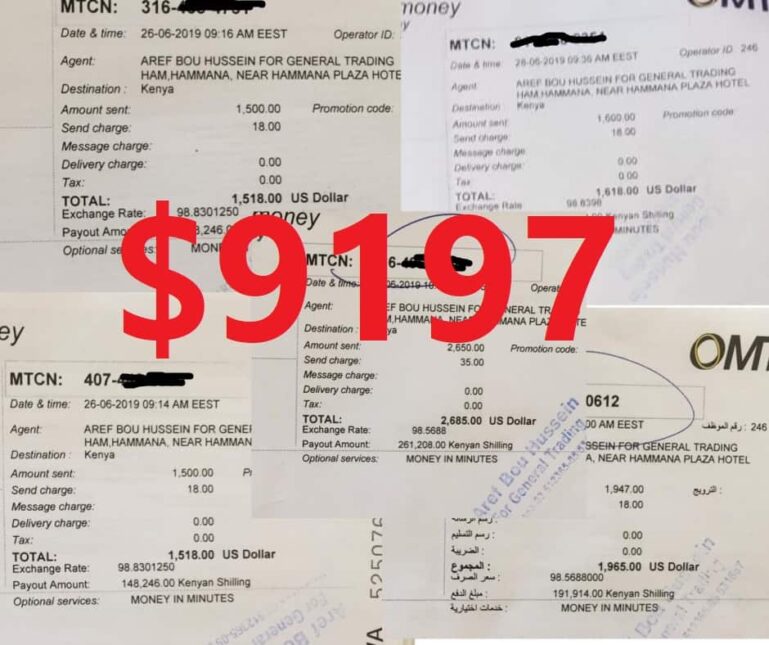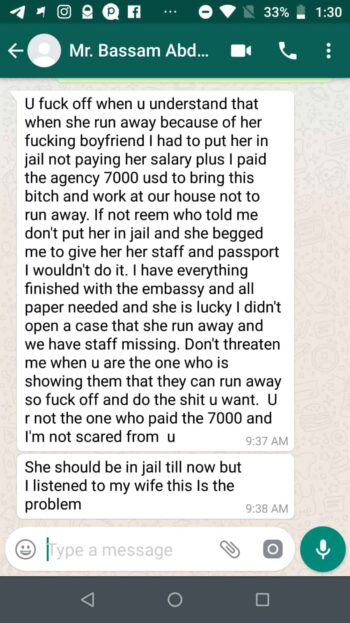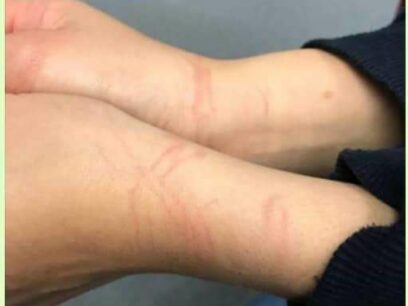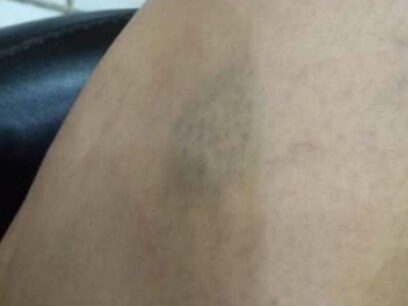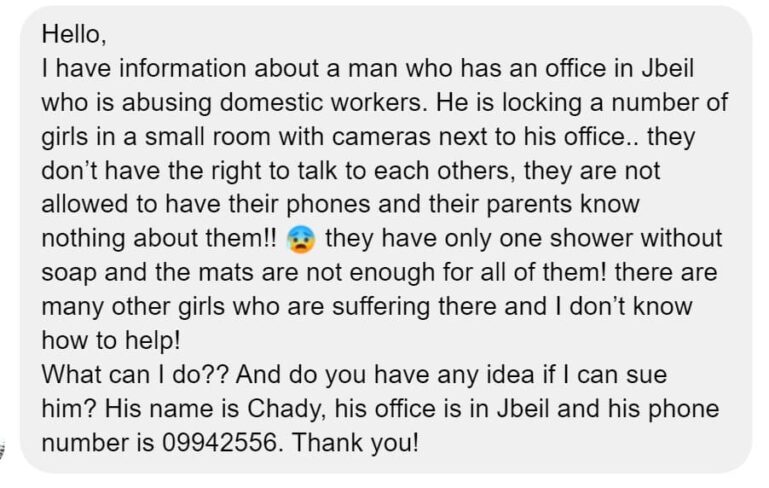THE STORY
Doreen arrived in Lebanon to begin work as a domestic helper on 24 August, 2011. She left behind her family in Kenya. Little did she know that she would struggle to get paid her basic salary, and that she would be allowed only limited contact with her family. Although she eventually got her salary, she was underpaid for the whole six years she spent working in Lebanon.
Doreen’s employers owned a large company in Beirut’s Downtown area. However, she was sent to work for the company owner’s elderly mother, who lived in a small town in the mountains east of Beirut. She lived and worked there for six years.
Doreen’s work entailed not just taking care of the old woman, but also working in the garden and climbing pine trees to harvest the pine nuts. Her employers said they would pay her extra for this work, but never did.
In 2017, after six years of work in Lebanon and with only rare contact with her family, Doreen begged to go home. She managed to get home to Kenya, but her employers still owed her thousands of dollars of unpaid salary.
Out of desperation to get her money, Doreen returned to Lebanon two weeks later – against her family’s wishes. Once more, she was denied contact with her family, and the promised salary was never paid.
On 10 May, 2019, Doreen’s brother, Jackson, contacted This Is Lebanon. He was worried because his sister hadn’t remitted money for years, and wasn’t in contact with them. By then, she was owed $10,900.
This Is Lebanon contacted Doreen’s employers. At first, they denied even knowing who she was. When they realised they had been discovered, they tried to bargain with Doreen over the amount they owed her. They told her that they’d had to travel back and forth to the town in the mountains to get her paperwork done, and therefore had to deduct $2,000.
They also told This Is Lebanon that Doreen had decided to buy gifts of clothes and phones for her family to the value of $2,000. Meanwhile, Doreen’s employers told her to take their daughter’s old clothes and tell This Is Lebanon that she’d bought them new.
In the end, they decided to pay her the full amount out of fear that she would expose them when she got home.
In Lebanon, Kenyans typically get paid $250 per month for the first year, and $300 thereafter. Despite this, Doreen was only ever paid $200 per month.
Thanks to pressure from This Is Lebanon, Doreen’s employers finally let her return home on 7 June, 2019. She left Lebanon with $1,000 in cash and $9,197 paid via Western Union in four separate payments. No wonder Doreen was dancing with joy when she got home.
As agreed with Doreen’s employers, we have kept our promise to protect their anonymity.
THE VIDEO
See Lydia tell the story of the abuse by Im Khaled and her family.
THE STORY
Lydia Nabangala, a Kenyan national, arrived in Lebanon on XXX XXX 2019 to begin a job as a domestic worker. She was employed by the Yassine family, based in Tripoli; she worked for Um Khaled and three sons, Khaled (otherwise known as Abu Khaldoun), Nader and Jawad.
Lydia was subjected to daily physical abuse by Jawad, who lived at home, and his mother. Lydia was made to work on a farm, planting, weeding and digging with her bare hands. She alleges that the family denied her adequate food and didn’t pay her.
She was made to clean two houses; Um Khaled is a co-wife, and Lydia had to clean the other family’s house as well. She often stayed up cleaning until 2:30am.
On XXX XX 2019, she managed to escape, and returned to her employment office. She told them: “I can’t work without money and food, and go on the farm. It’s not my work.”
“She was tearing my Bible, then she slapped me, and held me by the neck” – Lydia
Instead of helping her, the agent accused her of lying, and returned her to her abusers. On 5 August (?) 2019, the co-wife’s family emigrated to Australia. Before doing so, they took Lydia back to the employment agency.
This time, Lydia brought with her video evidence of her gruelling farm work, and of Um Khaled beating her up.
Meet The Abusers
These are the abusers and those who looked onto Lensa’s abuse and chose to help Eleanore Couture cover it up.
“I have experienced a lot of abuse. Nobody sees me and nobody helps me.” – Lensa
THE STORY
Sara* was 20 years old when she arrived in Lebanon on 6 January, 2006. She left behind her family in Manila, Philippines, to start a job as a domestic worker to help support them.
Sara* worked for Ibtissam Alsaadi and Ali AlKhatib for 11 months before escaping on the day they were moving house. She alleges that she was was sexually abused by her employer’s adult sons, Muhammad and Alaaddein. She worked day and night for Ibtissam Alsaadi, who locked her into her bedroom at night, and psychologically abused Sara* Grace in multiple ways.
During her enslavement, Sara* Grace considered suicide as a result of the abuse she suffered. Thirteen years later, she is still traumatised. The Alsaadi-AlKhatib family still owes Sara* five months salary.
Upon arrival in Lebanon, Sara’s new employer Ibtissam Alsaadi met her at Beirut airport and took her to the employment agency where she stayed for one night. Ibtissam took away all her documents, including her passport and a copy of the contract Sara had made for herself. In Manila, she had signed a contract agreeing to a salary of $200 per month. However, upon arrival in Beirut she was told to sign a new contract, stating her salary was $150. “They told me to sign it, but I’m thinking why is it different from the contract I read before,” she says. “I refused to sign, but they told me to sign it. I signed because I was afraid. Everything was confusing and I was scared about what would happen.”
The next day, Ibtissam took Sarato her house to begin work. Her first impressions of Ibtissam were not favourable: “I am not comfortable when I first saw her. I don’t see her as friendly, she don’t even greet me in the airport. She just took me and let me ride in the car.”
The evening of her arrival at their home, Ibtissam gave Sara some food, and then sent her to her room, which she locked until the morning. “She brought me in my room and locked me [inside]. And opened the next morning,” says Sara. “I sleep in my little room, on the floor with only a blanket.
Sara quickly realised that things were very wrong in the Alsaadi-AlKhatib household. “In my first month in their house, I feel uncomfortable because they are not treating me well and they always call me bad words without reason. They always call me in Arabic – stupid, khara [shit], khariye [piece of shit], behimey [a living creature without a brain]..”
Every day she was woken at 5.30am to begin work, with only coffee for breakfast, and lunch at 4.30pm. Sometimes she wasn’t given any dinner, and she worked until 11 or 12 at night. The only break she had was when she ate her lunch. “They gave me food twice a day, sometimes once. I’m taking bread because I’m hungry,” she says.
Every morning Ibtissam Alsaadi would make Lebanese coffee in separate pots for her husband Ali and for Sara. This was only the beginning of what was to come for Sara. She explains: “I saw her putting pink liquid into her husband’s pot of coffee. I asked what it was. She told me it’s for her husband because he has another girl from Sudan. And she cried, and asked me for sympathy.”
Saraalleges that one day Ibtissam asked her to fetch something from the living room whilst she made Sara’s coffee. She turned around to see Ibtissam pouring the same pink liquid into her own coffee cup. “She gave me a cup of coffee with this liquid, same as her husband. I poured it out directly in the sink. I stopped drinking the coffee she’s giving me.” She became very afraid to drink anything, suspecting that her employer was trying to poison her.
Ibtissam’s behaviour continued to get stranger and stranger. “The next thing, she’s telling me to scatter old ashes under the carpet, near the elevator by the front door,” says Sara. One day whilst cleaning her room, Sara found ashes under her own bed. Ibtissam would ask her to disperse ashes regularly under the carpet and near the elevator, adding to her already large workload. And presumably, it was yet another way to control Sara and to ensure that she remained afraid, and submissive and obedient.
“I’m still holding the trauma of those 11 months” “I’m still not healed from now. I start shaking when they open the topic about it.” – Sara
In July 2006, a 34-day war began between Lebanon and Israel. The Embassy of the Philippines assembled all Filipino nationals in Lebanon at the Embassy during this time. However, Ibtissam, whose family background was Syrian, took Sara to Syria. They stayed there for three months. According to Ibtissam’s Facebook profile, she has three siblings who live in Damascus.
Sara’s life in Syria was harder than in Beirut. “In Syria, her house is three stories and I am cleaning it all by myself. I am cleaning her sister’s house and her son Muhammad’s house also.” She was not remunerated for all the additional work she was made to do. After the war, Ibtissam brought her back to Lebanon.
Ibtissam commits more venomous acts to control her employee
Sara recounts how one day Ibtissam took her to a male hairdresser in a bizarre act of spite, under the guise that she was taking her for a regular haircut. Upon arrival, she was surprised to arrive at a men’s hair salon. The barber made her stand on a chair, and he cut her waist-long hair into a short, man’s style. “I was so sad, even in this little thing which she steal from me,” she says. Ibtissam then told her: “It’s ok, because your hair is not good and we must make [cut] it.” Back at her employer’s house, all the children began to tease her about her new haircut. She began to question why her employer was trying to hurt her and control her. “She slapped me like she want to kill me,” says Sara, in tears.
Sara had limited contact with Ibtissam’s husband Ali AlKhatib. Once he asked her to prepare some food for him, but she was often told by one of the five children to avoid Ali. “Whenever he was coming, they told me, go to the balcony. I waited there, even in winter when it was freezing. I had to just wait there standing until they told me mister went away.”
Ibtissam’s sons sexually abuse Sara
Ibtissam and Ali have five children: Muhammad, Alaaddein, Kinda, Sarah and Amir. Like their mother, they abused Sara to different degrees. In her testimony, Sara describes her suffering at their hands.
The eldest son, Muhammad, would frequently ask Sara to bring tubs of water to the bathroom while he was showering. He would be fully naked. The first time it happened, he called her back to the bathroom after she had gone to the kitchen, in shock. “I’m scared, I don’t know what to do, I don’t know what he will do to me and nobody is at home.” Kinda returned home and asked what the pot of water was for, and Sara explained that Mohammad had asked her to bring the water to him while he showered.
Sara says that Alaaddein, the second son, sexually and physically abused her. “Alaa is so cruel. He would ask me to find his glasses, quickly. And he would grab a wooden chair, gonna hit me [if she didn’t get them quickly enough].” Then one day, things took a turn for the worse. When the house was empty, he decided to prey on Sara. “My madam, she is not around, he come out of the kitchen and he sees that nobody is in the house and he goes back to his room and shouts ‘Sara, come, bring me a glass of water.’ Then he told me to come near and lay on his bed. And he started to touch my body and told me ‘I will teach you how to make massage’. He touched my back and my private parts, and then I started to cry and I said, please, no sir.”
Sara is visibly very distressed and crying as she recounts her abuse. She left the room but Alaaddein called her back in. “He told me to press his body, and he said ‘don’t ever write it down in a letter for your family in the Philippines’. After this incident, he continued to verbally abuse Sara and threaten her. “He started to be cruel to me, like he wants to hit me, and he’s a very big guy. I was afraid he might hurt me or I might get paralysed,” she says. She describes how Alaaddein constantly bullied her, threw footballs at her and hit her with hangers.
Other Filipino workers in neighbouring houses would communicate with Sarab y passing her notes telling her about the family and its previous workers. The notes recounted how a former employee, Norcia, was also abused by the family. They also locked her inside the house, alone, or with Alaaddein. Whilst cleaning, Sara once came across Norcia’s medical papers, and saw that she had had broken joints. Sara was frightened; what had happened to Norcia whilst working for the family? Her thoughts turned to suicide as a way to escape her employers. “I thought about drinking medicine to die as quickly as possible, and heal this trauma,” she says.
Sara’s parents would sometimes try to call her employer’s home. She says she wasn’t allowed to contact her family and her employers didn’t send home her salary regularly. To this day, she is owed five months of her salary. She only realised after she left that her family had been writing her letters which her employers had prevented her from seeing. Sara’s family had also not received any of the letters she had written them. It was yet another malicious act to ensure Sara remained under their control.
Sara escapes her enslavement
Sara finally managed to escape the clutches of the Alsaadi-AlKhatib family on the day they were moving apartments. It was 10am, and Ibtissam was busy talking on the phone, and Alaaddein was asleep. She tried the main door, and for once it wasn’t locked. She quickly gathered her papers, her contract and a photocopy of her passport, and left the house. “I walked down the stairs from the fourth floor, and after that I ran.”
She flagged down a taxi, and begged the driver to help her get to the Embassy of the Philippines. She told him she was being abused by her employers. “He told me, come, we will find it for you. He asked every shop where the embassy was. When I saw the flag of the Philippines, I cried because I was so happy. When I tried to pay the driver with the coins I had in my pocket, he refused, and said ‘god will give it to me.’”
Two days later, Ibtissam came to the embassy to try to get her employee back. She even went so far as to hire a Filipno woman to attempt to lure Sara back, with the promise of $500, a day off every weekend, a salary increase, and a new phone and sim card. Sara refused flat out. The next day, Ibtissam’s husband Ali AlKhatib came to the embassy. “He told me, come back to me, come to our house. I’ll give you food from my hands to your mouth.” When Sara refused to come back with him, he told her: “Hear me, you’re a hemara (donkey) and a fool.”
After her stay at the embassy, Sara was taken to NGO Caritas. Yet again, Ibtissam attempted to get her slave back. This time she came alone. “She wanted to take me. She told me, I can let you work for another family but you need to pay me $5,000.” Sara was advised by the embassy that she had two options: be deported to the Philippines, or find a new employer. She decided on the latter, and worked part time for UN workers. “They treat me well, they are helpful and kind. I work for Swiss, Croatian and Portuguese, Spanish, Irish..”
Each time the embassy and Caritas contacted Ibtissam Alsaadi, she insisted that her former employee had to pay her $5,000 before she could release her from the contract. Sara continued to work in Lebanon, and in 2013 she filed a complaint through Caritas, and was allocated a lawyer who contacted Ibtissam Alsaadi on her behalf. But Ibtissam was still asking for $5,000.
Meanwhile, Sara was following the case of Halima, her successor who was enslaved and abused by Ibtissam Alsaadi and her family for a decade. She questioned why the staff of the Embassy of the Philippines had met the Alsaadi-AlKhatib family in a restaurant in Raouche, and not at the embassy.
In April 2017, Sara heard that staff changes had taken place at the Embassy of the Philippines, so she decided to try her luck once more. She filed a second complaint, and requested to return home to the Philippines. Sara paid a $2,200 penalty to Ibtissam Alsaadi in return for her papers. At the embassy, she says she encountered many women in similar situations to her own. “There were a lot of other runaways, same as me with different employers but nearly the same experience as me. Maltreatment, lack of food, no salary, even lack of room in the house. They’re asking also for justice.”
She ends her testimony with thanks, and a warning: “I invite you, please don’t go to Lebanon. I know there is still good employers there but I heard a lot of people who are still there and suffering. You are lucky if you survive. You need to be strong. If you still continue [to go to Lebanon], please be brave and don’t let anyone put you down. We are human and we are the ones who can stop human slavery and trafficking.
“I want justice for the Alsaadi-AlKhatib family. I want them to be in jail and be punished by law, and be banned from taking any house maid from any country. I want justice for the damage they did to me and Halima.”
MEET THE ABUSERS
These are the abusers and those who looked onto Sara’s abuse and chose to participate or help Ibtisaam Saadi cover it up.
“I’m still holding the trauma of those 11 months” – Sara
FEATURED ABUSER
Ibtissam Alsaadi
Ibtissam Abdul Hamid Alsaadi
A serial abuser, slave owner and psychopath. Psychologically and physically abused her employees. Kept Halima as a slave for ten years.
Of Syrian origin, with at least three family members still in Damascus. Has tried, unsuccessfully, to run as a member of parliament in Lebanon since 2004, for the Sunni parliamentary seat in the district of Baalbek and Hermel. Ibtissam Alsaadi is known for being closely connected to Lebanon’s political elite. She has previously been photographed with President Michel Aoun, as well as high-ranking leaders of the Maronite church.
She has a degree and background in political science, and has been active in social work for the past two decades. She has previously expressed that she believes that women should participate in elections and democratic battles in order to reach their representation in the best way.
Despite her alleged extensive abuse of her own employees, Ibtissam’s name was put forward as a potential Minister for Women in the new Lebanese government, formed in early 2019.
“My career in charity work continues without greed for a high position” – from Ibtissam’s campaign poster.
“Entering the political arena should not be limited to men; men and women share all life decisions, so why not extend the sharing to political decisions, developmental work and services.”
The People
THE STORY
Cecilia and Emelda came to Lebanon from the Philippines in February and March 2015, respectively. Both are owed around $5,000 each in unpaid salaries. They allege they were kept as slaves by their employers Abdallah Al-Rafii and Maha Moukashar Al-Rafii. Their employers wouldn’t renew their documents, which meant that Cecilia and Emelda could have been arrested at any time for working illegally, and they did not pay them their salaries, nor would they let them leave. Abdallah works as a lawyer in Dubai and Abu Dhabi, while his wife Maha, also a qualified lawyer, lives in Beirut. The Rafis own homes in Bir Hassan, Beirut, and Burj Al Khalifa, Dubai.
As Cecilia and Emelda explain in their video testimony, they came to Lebanon to work so as to be able to help their families. Cecilia’s mother is ill, and Emelda has three children to support. They were employed by Abdallah and Maha Al-Rafii.
On 4 March 2018, Emelda contacted This Is Lebanon asking for help for her and her colleague, Cecilia. They were both owed approximately $5,000 each in unpaid salaries. When This Is Lebanon asked her if she’d contacted the embassy, she replied: “Yes maam the polo (branch of the embassy) said we should run away but we are scared to run away, what will we do?”
“They keep on promising that they will fix our papers” – Emelda
By May 2018, they had given up hope of ever receiving their salaries, and decided to abandon their employment. On their behalf, This Is Lebanon contacted their employers, Abdallah and Maha Al-Rafii, asking them to pay their salaries and advising that if they didn’t pay, Cecilia and Emelda would have no option but to expose them on Facebook.
Abdallah replied: “Regarding the maids that escaped this morning! Please be informed of the following: let them come before 2pm, or else the case will be with the General Security & Public Prosecutor, and they will never travel to their country by Government decision. Legal action has been taken against them. Don’t blackmail, it’s crime by law and they will be charged for that.”
Because they did not receive their salaries and were afraid of what Abdallah and Maha could do to them, on the same day they had fled, they took refuge at the Philippine Embassy.
At the end of October 2018 they left for the Philippines after spending about 5 months in the embassy safe house, and 2 weeks in the safe house of NGO Caritas. They traveled without receiving any of the money they were owed.
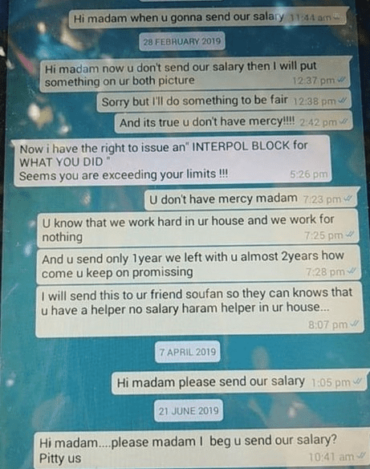
Eight months on, and Cecilia and Emelda’s salaries still haven’t been paid. Here is a screenshot of messages Emelda sent to her employer Maha Rafi in 2019, asking for the salaries to be sent.
“Now I have the right to issue an Interpol block for what you did! Seems you are exceeding your limits” – the reply from Maha Rafi, when all her former employee did was to text her and ask for the remaining $5,000 of her salary to be sent.
As can be seen from the messages, in June 2019 Maha Al-Rafii said she hoped to be able to ‘soon’ send the salaries.
On 13 July 2019, Emelda contacted Maha again, asking her to have mercy and pay the salaries. As detailed in the screenshot below, Maha replied saying she is ‘working legally’ and that ‘the lawyer in Canada’ [we’re not sure what lawyer she’s referring to but would welcome the Al-Rafiis bringing a case against This Is Lebanon in Canada] will be ‘arrested by Interpol soon’. Maha goes on to allege that items were stolen from her – something not mentioned at the time they left.
Caritas (a Lebanese NGO) lawyers have taken their case. Will Emelda and Cecilia receive justice in the Lebanese judicial system? That remains to be seen.
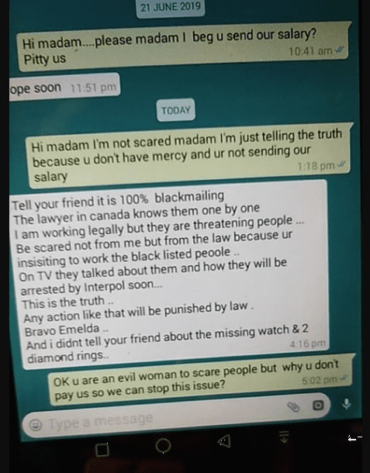
القصة
عبد الله ومها رافي: محاميان ومالكي عبيد. عبد الله ومها رافي محاميان و مالكي عبيد لا يزالان مدينين بمبلغ 10،000 دولار لموظفتيهما السابقتين.القصة جاءت سيسيليا وإميلدا من الفلبين إلى لبنان في فبراير ومارس ٢٠١٥ على التوالي. مستحقات كل واحدة منهما على حدةٍ حوالي 5000 دولار هي قيمة رواتب غير مدفوعة. تزعمان أن أصحاب عملهم عبد الله ومها رافي احتجزوهما كعبيد. لم يكن أصحاب عملهم يجددون مستنداتهما ، مما يعني أنه كان يمكن إلقاء القبض على سيسيليا وإميلدا في أي وقت لقيامهما بالعمل بشكل غير قانوني ، ولم يدفعوا لهما رواتبهما ، ولم يسمحوا لهما بالمغادرة. يعمل عبد الله محامياً في دبي ، بينما تعيش زوجته مها ، وهي محامية مؤهلة أيضا في بيروت. يمتلك الزوجان منازل في بئر حسن وبيروت وبرج آل خليفة في دبي. كما توضح سيسيليا وإميلدا في شهادتهما بالفيديو ، فقد جاؤوا إلى لبنان للعمل حتى يتمكنوا من مساعدة أسرهم. والدة سيسيليا مريضة ، وإميلدا لديها ثلاثة أطفال لتعيلهم. كانتا تعملان لدى عبد الله ومها رافي. في ٤ آذار (مارس) ٢٠١٨ ، اتصلت إميلدا بـ “هذا هو لبنان” لطلب المساعدة لها ولزميلتها سيسيليا. وكانت مستحقات كل منهما على حدةٍ حوالي 5000 دولار قيمة رواتب غير مدفوعة. عندما سألها ” هذا لبنان” عما إذا كانت قد اتصلت بالسفارة ، أجابت قائلة: “نعم سيدتي ، قال البولو (فرع السفارة) إنه يجب علينا الهرب لكننا خائفون من الهرب ، ماذا سنفعل؟”“يعدوننا مراراً بأنهم سيصححون أوراقنا” – إيميلدابحلول مايو ٢٠١٨ فقدوا الأمل في تلقي رواتبهم على الإطلاق ، وقرروا ترك وظائفهم. اتصل “هذا لبنان” نيابة عنهم بأصحاب عملهم عبد الله ومها رافي، وطلبوا منهم دفع رواتبهم وإبلاغهم بأنه إذا لم يدفعوا، فلن يكون لدى سيسيليا وإميلدا أي خيار سوى كشفهما على فيسبوك. أجاب عبد الله: ” بخصوص الخادمتين اللتين هربتا هذا الصباح! يرجى العلم بما يلي: دعوهما يحضران قبل الساعة ٢ ظهراً ، وإلا فستكون القضية مع الأمن العام والمدعي العام ، ولن تسافرا أبداً إلى بلدهم بموجب قرار حكومي. تم اتخاذ إجراءات قانونية ضدهما. لا تبتزوا ، إنها جريمة بموجب القانون وسيتم توجيه الاتهام إليهما “. ولأنهما لم تتلقيا رواتبهما وكانتا خائفتين مما يمكن أن يفعله عبد الله ومها بهما ، في نفس اليوم الذي فررن فيه ، لجأن إلى السفارة الفلبينية.في نهاية أكتوبر ٢٠١٨ ، غادرتا إلى الفلبين بعد أن أمضيا حوالي ٥ أشهر في منزل آمن للسفارة ، وأسبوعين في المنزل الآمن لمنظمة كاريتاس غير الحكومية. سافرتا دون تلقي أي من مستحقاتهما المالية.بعد مرور ثمانية أشهر لم يتم دفع رواتب سيسيليا وإميلدا. إليكم لقطة من الرسائل التي أرسلتها إميلدا إلى صاحبة العمل مها رافي في عام ٢٠١٩ ، تطلب فيها إرسال الرواتب.”الآن لدي الحق في إصدار حظر من الانتربول لما قمت به! يبدو أنك تجاوزت حدودك “- كان هذا رد مها رافي على مجرد بعث موظفتها السابقة رسالة نصية لها وطلب إرسال المبلغ المتبقي وقدره 5000 دولار من رواتبها.كما يتبين من الرسائل ، في يونيو ٢٠١٩ ، قالت مها رافي إنها تأمل أن تتمكن من “إرسال” الرواتب قريباً. في ١٣ تموز (يوليو) ٢٠١٩ ، اتصلت إميلدا بـ “مها” مرة أخرى ، وطلبت منها أن ترحم وتدفع الرواتب. كما هو موضح بالتفصيل في الصورة أدناه ، ردت مها قائلة إنها “تعمل بشكل قانوني” وأن “المحامي في كندا” [لسنا متأكدين من المحامي الذي تشير إليه ، لكننا نرحب بعبدالله الذي رفع دعوى ضد هذا لبنان في كندا] سيتم “القبض عليه من قبل الإنتربول قريباً”. تستمر مها في الادعاء بأن اشياء قد سُرقت منها – وهو أمر لم يرد ذكره في وقت مغادرتهم. وقد نظر محامو كاريتاس (منظمة غير حكومية لبنانية) في قضيتهم. هل ستحصل إميلدا وسيسيليا على العدالة في النظام القضائي اللبناني؟ لنرى ما سيحدث.
نص رسالة الواتساب الاولى: العاملة: “مرحبا أيتها السيدة. متى سترسلين رواتبنا؟”٢٨ فبراير ٢٠١٩العاملة:“مرحبا أيتها السيدة الآن انت لا ترسلين راتبنا إذا سأضع شيئا على صورتكما. عفواً لكني سأفعل شيئاً لأكون عادلة. و فعلاً ليس عندك رحمة!!!”صاحبة العمل: “الآن لدي الحق في إصدار حظر من الانتربول لما قمت به! يبدو أنك تجاوزت حدودك “العاملة: أيتها السيدة ليس عندك رحمة. أنت تعلمين أننا عملنا بجد في منزلك و عملنا من أجل لا شيئ. و ترسلين فقط سنة و احدة، تركنا معك ( أجر) سنتين تقريباً. كيف تواصلين وعودك؟ سأرسل هذا إلى صديقك صوفان كي يعلموا أن لديك مساعدة بلا راتب حرام مساعدة في بيتك….٧ ابريل ٢٠١٩ العاملة: مرحبا أيتها السيدة من فضلك أرسلي رواتبنا. ٢١ يونيو ٢٠١٩العاملة: مرحبا أيتها السيدة . . . من فضلك أرجوك أرسلي رواتبنا؟ أشفقي علينا.
نص رسالة الواتساب الثانية:٢١ يونيو ٢٠١٩العاملة: “مرحبا أيتها السيدة…. من فضلك أرجوك أرسل رواتبنا؟ أشفقي علينا.صاحبة العمل: نأمل قريباً.اليوم العاملة: مرحبا أيتها السيدة. أنا لست خائفة يا سيدة. إني أخبر الحقيقة لأنه ليس لديك رحمة و لا ترسلين لنا رواتبنا.صاحبة العمل: قولي لصديقك انه ابتزاز ١٠٠ ٪. يعرفهم المحامي في كندا واحدا و احدا. أنا عمل بشكل قانوني لكنهم يهددون الناس…. لا تخافي مني بل من القانون لأنك مصرة أن تعملي الأشخاص المحظورين. تحدثوا عنهم في التلفزيون و كيف انه سيتم إعتقالهم من قبل الإنتربول قريباً هذه هي الحقيقة… أي فعل كهذا سيعاقب عليه القانون. برافو إيميلدا …. و أنا لم أخبر صديقك عن الساعة و خاتمين الألماس المفقودين.العاملة : حسناًَ أنت إمرأة شريرة لتخيفي الناس لكن لماذا لا تريدين أن تدفعي لنا لكي نوقف الموضوع؟
Tony Khalife on Al Jadeed
In late April, 2019, Tony Khalife, host of a TV programme on Al Jadeed, aired the plight of an Ethiopian domestic worker who had run away from her employers and been found on the street by a Lebanese family who took her in and gave her food and water. She had been beaten black and blue and had bruises over her whole body.
The Lebanese described the treatment she’d received as extremely cruel.
The family called the police and she was taken away. A few days later, she turned up at their house again. She said the police had returned her to her employers who had given her a fresh beating for running away.
This time, the employer and his son came to the house at midnight to take her back. The worker implored the family not to release her to them, certain they would beat her up again. The employer admitted his wife had given the worker a ‘couple of smacks’ but that her bruises were self-inflicted, something that was patently untrue due to the location of many of the bruises on the woman’s back.
The family called Tony Khalife for assistance and said that they had received threats and warnings not to go on the programme. Tony did not reveal the identity of the abusive employer, instead referring to him as a member of the security apparatus and a person of influence. He did, however, refer the case to the head of General Security and was hopeful of a positive outcome for the victim. We have been able to discover the abuser’s name. He is Lieutenant Colonel Riad Ezeddine from the village of Bachita, inland from Tyre. He and his abusive wife and son should not enjoy anonymity.
THE VIDEO
Fe explains how Bassam Abdel Hadi, owner of Monroe Hotel Beirut and Crystal Spa, cheats and denigrates his workers.
THE STORY
Loriefe (Fe) Durato was employed as a domestic worker in the home of Bassam Abdel Hadi and Reem Yacoub Abdel Hadi from 1 October 2016 to 13 August 2018, after which she fled to the Embassy of the Philippines. The Abdel Hadis own the Crystal One Spa in the four-star Monroe Hotel in downtown Beirut. In total, the Abdel Hadis owe Fe $2,000. For two years they neglected to renew her work and residence permit, which meant she could have been imprisoned at any time.
Fe contacted This Is Lebanon via Facebook in April 2019 to seek help, as she had been sent home to the Philippines with almost 6 months of unpaid salary. Three months’ worth of this had been paid to the agent, something which was declared illegal by the Ministry of Labour in 2007.
Fe was afraid, because 10 other Filipinos who had previously worked at the spa were imprisoned for 3 months. She suspected that their imprisonment was because the Abdel Hadis hadn’t renewed their work permits either, and she didn’t want to end up in prison like them.
Fe told This Is Lebanon that the Abdel Hadis often didn’t have cash, and that she herself paid for deliveries that they had ordered. The Abdel Hadis still owe Fe 10,000 LL ($7) for manoushes (a traditional Lebanese dough-based food, similar to pizza) which she’d paid for because the Abdel Hadis had no money to pay the delivery man.
Fe faced other difficulties whilst working for the Abdel Hadis. Shortly before fleeing to the embassy, Fe alleges that she found that $200 had been taken from her closet by Bassam Abdel Hadi. It had been hidden underneath her clothes. After that, she put a lock on her closet. Reem Abdel Hadi also did not provide all the personal items, such as clothing and hygiene products, she was required to under the terms of the domestic worker’s contract.
This Is Lebanon contacted Bassam Abdel Hadi via WhatsApp, requesting that he pay Fe $800 for 2 months she worked unpaid, plus $1200 for the 3 months he caused her to stay in a safe house. He responded, alleging that Fe had run away with a boyfriend and that “such a maid should be punished for what she did.” When This Is Lebanon asked him for copies of her residence permit, he refused, saying, “stop annoying me. I don’t have to show you anything.” He then blocked us.
We wrote to Reem Yacoub Abdel Hadi saying: “Your husband just made a very unwise decision. Blocking us is not going to solve your problem. It is better to talk. If you did, indeed, do her papers on time each year than you are in the right and this story can be stopped immediately. Please send us a pic of the iqama (work permit) so I can see who is telling the truth. We are giving you an opportunity to show you are right.”
Reem responded that she did “everything and more than everything that this girl needs, and that each girl that works in the house is the most lucky girl ever, and about her papers, she has only one missing year.”
After our conversation, Reem contacted Fe and said she hadn’t sent the salary because she had lost her phone with Fe’s contact details. She had promised to send the salary after Fe returned home. Fe told us that was a lie, and that Reem had seen her messages and not responded, even after she’d told her she needed the money to register her kids in school and help with her father’s hospital bill.
Nevertheless, because of Reem’s promise to put things right, we held off posting. By June 2019 there was still no payment, so we contacted Bassam from a different number. The image to the right is his response.
Fe fled to the embassy for protection; she did not run off with a boyfriend. She did not steal anything from the Abdel Hadi’s house. This is one of the most common accusations. Time and again, domestic workers who escape abusive working conditions are accused of theft and end up doing prison time when they are the victims, not the criminals.
The Abdel Hadis have left us with no option but to post about them. May this serve as a warning to them and others who choose to keep workers undocumented. What would have happened if Fe had had an accident and required hospitalization?
Meet The Abusers
“There is 10 girls working in the spa [who] went in jail. They stayed 3 months in jail.” – Fe
TAKE ACTION
We can’t do this alone. We need your help! Join us in this fight.
Review on FB
Tell Monroe hotel what you think of Crystal One Spa’s owner’s treatment of domestic workers.
Review on Google
Let any potential visitors on Google know the truth about the owner of Crystal One Spa.
Contact the Abusers
Talk to Bassam and Reem and plead with them to pay their workers and treat them properly.
Share the Story
Tell others about this. Join us in the fight to ensure that this cannot go unnoticed.
THE STORY
Keriya’s family contacted This Is Lebanon on 23 December 2018. They were worried because Keriya, an Ethiopian national, had been in Lebanon for six years. She had finished her contract. Why hadn’t she come home? Why hadn’t she sent them any money for six months?
This Is Lebanon began to investigate. We contacted Keriya’s employer who said: “I asked Keriya many times if she wanted to return home, but she always said no,” alleging that Keriya had stayed working for them of her own free will.
This Is Lebanon insisted that the employer had to register Keriya officially at the Lebanese General Security, the institution which handles work and living permits, and sort out all her documents. If the employer didn’t agree to do this, and to pay Keriya’s outstanding salary, This Is Lebanon would expose the employer on Facebook.
The employer agreed, and Keriya flew home to her family in Ethiopia in April 2019.
01
Frenslyn Villarin’s Testimony
I entered their house on 12 June, 2017. At first, they pretended to be good employers, giving me what I needed, no shouting, saying ‘please’ and ‘thank you’ and ‘wow, Lyn, we like you’. They treated me like a human for a total of one month. After that, the ‘f*** you’ and ‘habla’ (idiot) and other Arabic words that back then I didn’t understand started. When the verbal abuse began, I asked them for my freedom and requested they return me to the agency.
The next day, the family driver (they are connected to the government and have a driver supplied by the police) took me to the agency office after Cesar told me, “If you want to go back to the office, you have to pay $5000 or I will send you to prison. I am powerful here in Lebanon because my father is the president here.” The day I went to the office, I was so excited because I thought, ‘YES, I am free.’ When I arrived there with the police driver behind me, the agent, Bob, asked me why I wanted to change employers and whether they weren’t treating me well. The driver was listening and sending messages to my employer to tell him what I was saying. At that time, I made a bad decision out of fear and said, “No, they are good, but I can’t handle the children.” Bob told me my problem was simple and I should allow time for the children to like me. As I turned to go I saw the driver calling and saying, “Madam, ma fi mishkale (there is no problem).”
When I got back to the house, the Gebaras said, “See. We told you if you leave, you have to pay us.” At that time my husband was unemployed and my daughter had just been diagnosed with enlarged lymph nodes in her neck. I started to accept the reality that maybe this was God’s will for me. I had two workmates, a Sri Lankan woman called Tala and another Filipino called Janice. I saw how they suffered. They hit and punched them. Poor Tala became so thin and sick and one day fell down in ABC Mall because she had no energy. I personally suffered inhumane abuse in their house between 12 June, 2017 and 5 March, 2019.
On 2 March, 2019 I was very tired and I worked up the courage to tell them that I wanted to go home because I was the only worker at that time. There was a Lebanese woman doing the ironing but I was in sole charge of the 4 kids and had no proper time to sleep and worked hard all day. I felt very tired and weak and sometimes felt like I was going to fall from dizziness. When I told them I wanted to leave, they immediately called for the driver to take me to their house in Jdeideh next to Pharmacie Nancy owned by my madam. I stayed there for 3 days. The first day, they called my agency and got Jake, a Filipino who works at the agency, to tell me that I could not go home and had to finish my contract. I told Jake that previous workers had gone home to our country without their salary or personal possessions and that even if I finished my contract I thought they’d do the same to me. Jake agreed to talk to Bob and try to help me to leave. I told him that they were animals and when he went they would hit me like they did the other workers and maybe kill me and I begged him to take me to the office but he didn’t believe me and left.
Two hours later, Cesar and the Lebanese helper, Meray came in. Cesar told me I had no right to say I was tired and wanted to go home and said I had to stay because the children loved me. I told him I was very tired and my body could no longer handle it. He was quiet and told Meray to go to the salon and check on some things there. When she left, he forcefully put his feet on my head and said in a low voice, “You are a big sharmouta” (whore). I started to cry and said, “Why are you hitting me?” Then Meray came in and said, “Lyn, he is not hitting you. I am here with him.” He was very sneaky. They left.
On the second day, Cesar came alone and told me I had to make a deal with him or he would get me sent to prison for life and I would not see my daughter or husband again. He said I couldn’t go because his children were attached to me. I repeated that I needed to leave and once again he kicked me on my head and legs. He said, “Tomorrow I will come back. If you don’t return, you will see what will happen. Maybe the police will come and put you in prison.” The third day came and I was shaking. Cesar came alone again; he walked in singing like the devil. He said, “Stupid sharmouta, if you won’t stay, I will kill you tonight and throw you somewhere and no one will know.” He kicked me again in my head and on my legs. I was crying and he said, “Oh, you have a nice voice even when you’re crying. Mark my words, I will kill you tonight.” And he left.
After he left, I prayed, “God, if I die tonight, please take care of my daughter and husband and my family as well. If I die, I know I will be with you.” Then I stood up because I wanted to use the toilet. When I turned my head, I saw a picture of the Virgin Mary in the house next door. This gave me hope. From the window, I saw a woman of about 50 years old, cooking and cleaning. She looked Lebanese. I prayed, “I want to shout to make this woman hear me. I will ask her for help. Send me a sign if I should continue.” I opened the window and shouted, “Madam, madam, please help me, madam!!!” She didn’t hear me. I shouted again even louder and she heard. She said, “Shoo?” (what) You speak English or French?” I told her English and said, “Please, madam, help me. Mr Cesar Gebara, the son of Mr. Antoine Gebara, the president of Beirut, wants to kill me tonight.” Because she couldn’t hear me clearly she made a sign which meant “wait, ok. We will call the police.” Then I saw them talking and they closed all their windows and I knew that when they heard the name Cesar Gebara they became afraid.
I waited a long time but they’d closed their windows and I started to cry again. Then I stood up and thought to myself, ‘No! Mary sent me a sign and I have to work for it! I walked into the salon and decided to stay near the locked door so that if I heard any noise I could beat on the door loudly so that someone would hear me. I heard the voice of two women and I beat on the door and screamed, “Madam, madam, I’ve been locked in here by Mr. Cesar Gebara for 3 days and he wants to kill me”. The women said, “Why did he lock you in? What did you do?”
I explained how I’d told him I wanted to leave and how every day I felt like I was going to faint and could see all black. I asked them to call the police not him because he would lie to them and kill me. They said that he wouldn’t be able to kill me because they would stay with me. I was scared that he would come but instead he a driver. He said, “Yalla (come on) Lyn, the boss wants to send you to the agency. I told the two women that he would not take me to the agency but he forced me into the car. As we were driving, I noticed that we weren’t going towards the agency and said so to the driver. He asked me, “What happened, Lyn? Did Cesar hit you?” I told him that he’d beat me up and wanted to kill me. He felt pity for me and allowed me to use his phone. I talked to Jake and Bob and told them what had happened. Bob said he would buy me a ticket and that my flight would be at 12:30 in the morning. I saw on the clock that it was only 6 p.m. The driver told me to be strong and said he couldn’t do anything to help me as he was just an employee like me.
He stopped the car outside the house and said, “The boss wants to see you.” He took me to the elevator and said that Cesar wanted to put me on the terrace. When we got there, Cesar told Jonny to leave. The only ones there were me, Cesar and another worker. They tied up my hands so I couldn’t move and they closed the door so no one could hear me. Cesar punched me in the head saying, “Sharmouta, we pray your daughter will die soon.” He punched me again, kicked me in the legs and knees and again on the head. I was strong and accepted what was happening. He said, “You cannot go home. You will die here and we will throw you from the window and tell people you committed suicide. No one will ask questions.”
I couldn’t breathe and asked for water. He took a glass of water, drank some of it, and threw the rest in my face, laughing all the time. I knew his wife was watching on camera because their house had lots of cctv. I was praying that it would turn 12 so I could go to the airport. He punched me and hit me until 10:30 pm. I heard Bob call him and he replied, “Yes, she is just preparing her things.” He kicked me until I fell over but still I was strong. He got his worker to remove my uniform and ordered him to kick me. I was standing there in my bra and underpants. The worker also hit me. I know he is a good man but he was afraid of Cesar. At 10:30 the police driver arrived. Cesar told me I was going to prison but I knew that Bob had bought me a flight. They lead me down to the car with my hands tied.
I never got my personal things and they owe me $1000. The agent helped me out financially but the Gebaras didn’t pay what they owe me. I went to the airport in ripped pants, no bags, no money; just my passport. When I got to the airport, the driver told me, “Don’t talk to anyone. You know how powerful Gebara is.” The ticket was only to Manila but I live in Iloilo. Thankfully, Qatar Airways helped me to get home. They let me fly for free and gave me some money to buy some food and things. Because I didn’t have a phone, they took the phone number and Facebook of another Filipino in the plane and sent my ticket to her. I have messaged the Gebaras since I got home. They replied, “You took more than you deserve and more than your rights other than what you stole from us. You robbed our money (4000$) that was our children’s school payment. I promise I will get back my money from you even if you are in Philippines. I have already contacted the interpol’s offices, and the agencies in Lebanon and the Philippines, and opened a case to get back what you stole from us. Look how crazy you are. Justice is coming.”
I never got my personal things and they owe me $1000. The agent helped me out financially but the Gebaras didn’t pay what they owe me. I went to the airport in ripped pants, no bags, no money; just my passport. When I got to the airport, the driver told me, “Don’t talk to anyone. You know how powerful Gebara is.” The ticket was only to Manila but I live in Iloilo. Thankfully, Qatar Airways helped me to get home. They let me fly for free and gave me some money to buy some food and things. Because I didn’t have a phone, they took the phone number and Facebook of another Filipino in the plane and sent my ticket to her. I have messaged the Gebaras since I got home. They replied, “You took more than you deserve and more than your rights other than what you stole from us. You robbed our money (4000$) that was our children’s school payment. I promise I will get back my money from you even if you are in Philippines. I have already contacted the interpol’s offices, and the agencies in Lebanon and the Philippines, and opened a case to get back what you stole from us. Look how crazy you are. Justice is coming.”
They are Christians but they are evil. Every time they had a party, they would give the leftovers to poor people in Lebanon but we ate food that was 6 days old or more. They want people to think they are very good because Mr. Cesar wants to run in politics. All I want now is justice and to be able to buy my daughter diapers.
Felma Reyes Testimony
My name is Felma Reyes. I worked for Cesar and Nancy Gebara from December 2014 until May 2017 – two years and five months. The problem I had with them was that they wouldn’t let me leave even though I’d finished my contract. They said I couldn’t leave because the kids loved me. My body was falling down and one day I feel I fall and die because every night I didn’t sleep because of their babies and the full day’s work. I didn’t have any energy.
02
I told them I wanted to go home and again they said, “No, Felma. You can’t do that.” In the end, I said I wanted to go home on vacation and I would come back. They refused saying that I wouldn’t return but I smiled and said, “I will come back because your kids love me.” After that they talked and said if I come back they can keep me alone in the house because I can do all the work and care for their kids. They decided to let me go home on vacation but they didn’t give me all my salary. I said, “It’s up to you madam/sir if you do that to me.”
One day, also, Mr. Gebara beat me on my legs. Janice saw it happen and the kids were crying with me. I was also crying in the car. Two weeks after I got home, madam Nancy called me to see if I was ready to come back and I said, “Sorry, madam, I don’t want to come to your house because my family doesn’t want me to leave. I need a rest, madam. Sorry.” Five months later, Nancy sent me a message saying that I had stolen their things and she called me bad words. I told her I’m not a stupid person to steal her things and I’m not a liar. She has cameras throughout her house. God knows who is the liar.
I don’t understand how they could accuse me after I was so good to them, especially their kids. God knows I am telling the truth. They told me they are very powerful and have a lot of money and can do whatever they want. I told myself, ‘I can find money again but not life if I stay in the devil house with the devil sponsor’. I left my $1750 with them. They can be a bit richer from it. The important thing is that I saved my life. I only pray that one day God will punish them for the terrible way they treat poor people, especially domestic workers.
03
I’m Leanne Joy Roflo. I worked for the Gebaras from July 2013 to October 2015. From 2013 to 2014, I worked in their house and also in Nancy’s mother’s house and Nancy’s pharmacy. I cared for their oldest daughter as well. When madam got pregnant, Felma came so we were two workers. Madam delivered twins; Felma took care of them and I cleaned the house. If the babies were asleep, Felma helped me with the housework. When my contract finished, I told them I wanted to go but they said no.
One day, I called my agency in Lebanon and asked sir Gabby, who owns the agency, if I could go back to the Philippines since my contract had finished. He said I could and nobody could force me to stay so the next day, I knocked on their door and I stood and said, “Madam/sir, sorry, I called my agency and asked them if I can go since I finished my contract. The agency said yes.” Mr. Gebarra got angry with me and said, “Who told you that you could use the phone?” I said, “Sir, I only used it to call the office and ask if I can go because you told me I couldn’t go.”
Leanne Joy Roflo testimony
Mr Gebarra shouted at me and said he was going to put me in jail. He used many bad words and said he could do anything he wanted because he was a lawyer and his father was president. I stood there and said there was no reason to send me to jail. I had only done my job in his house. That day, madam Nancy sent me to the office and I stayed there 3 weeks before leaving. They did not give me all my salary. They still owe me $1000. My salary was $200 per month and they didn’t pay me the last 5 months.
Arabic Translation
شهادة فرينزلين فيلارين دخلت بيتهم في 12 يونيو 2017. تظاهروا في البداية بأنهم أصحاب عمل طيبون. أعطوني ما احتجت بدون صراخ. قالوا “من فضلك” و ” شكرا” و ” روعة يا لين نحن نحبك.” لقد عاملوني كإنسان لمدة شهر واحد. بعد ذلك ، بدأت الكلمات البذيئة و بلهاء وغيرها من الكلمات العربية التي لم أكن أفهمها في ذلك الوقت. عندما بدأت الإساءة اللفظية ، طلبت منهم حريتي وطلبت إعادتي إلى الوكالة. في اليوم التالي ، أخذني سائق العائلة (إن لهم صلات بالحكومة ولهم سائق تزوده الشرطة) إلى مكتب الوكالة بعد أن أخبرني سيزار ، “إذا كنت تريدين العودة إلى المكتب ، يتعين عليك دفع 5000 دولار أو سأرسلك إلى السجن. أنا قوي هنا في لبنان لأن والدي هو الرئيس هنا. ” في اليوم الذي ذهبت فيه إلى المكتب ، كنت متحمسة للغاية لأنني اعتقدت” نعم ، أنا حرة. “عندما وصلت إلى هناك مع سائق الشرطة ورائي ، سألني الوكيل بوب عن سبب رغبتي في تغيير أصحاب العمل و إذا كانوا لا يعاملونني جيدًا. كان السائق يستمع ويرسل رسائل إلى صاحب العمل ليخبره بما كنت أقوله. في ذلك الوقت ، اتخذت قراراً سيئاً بسبب الخوف وقلت: “لا ، إنهم طيبون ، لكن لا يمكنني التعامل مع الأطفال”. قال بوب أن مشكلتي بسيطة ويجب أن أتيح الوقت للأطفال كي يحبوني. وبينما التفت لأذهب ، رأيت السائق يتصل ويقول ، “سيدتي ، لا توجد مشكلة”. وعندما عدت إلى المنزل ، قالت عائلة جبارة لي “فهمتي. قلنا لك إذا تركت ، عليك أن تدفعي لنا “. في ذلك الوقت ، كان زوجي عاطلًا عن العمل وتم تشخيص ابنتي للتو بتضخم العقد اللمفاوية في رقبتها. بدأت أقبل حقيقة أنه ربما كانت هذه إرادة الله لي. كان لديّ زميلتان في العمل ، امرأة سريلانكية تدعى تالا ،و أخرى فلبينية تدعى جانيس. رأيت كيف عانوا. ضربوهما ولكموهما. أصبحت المسكينة تالا نحيلة جدا ومريضة، و ذات يوم سقطت في مركز تسوق ABC لأنه ليس لديها طاقة. أنا شخصياً عانيت من سوء المعاملة الوحشية في منزلهم بين 12 يونيو 2017 و 5 مارس 2019. في 2 مارس 2019 كنت متعبة للغاية واستجمعت شجاعتي لأخبرهم أنني أريد العودة إلى وطني لأنني كنت العاملة الوحيدة في هذا الوقت. كانت هناك امرأة لبنانية تقوم بالكي ولكنني كنت المسؤولة الوحيدة عن الأطفال الأربعة ولم يكن لدي الوقت الكافي للنوم وعملت بجد طوال اليوم. شعرت بالإعياء والضعف وأحياناً شعرت كأنني سأسقط من الدوخة. عندما أخبرتهم أنني أرغب في المغادرة ، طلبوا على الفور من السائق أن يأخذني إلى منزلهم في الجديدة بجانب صيدلية نانسي التي تملكها سيدتي. مكثت هناك لمدة 3 أيام. في اليوم الأول ، اتصلوا بوكالتي وجعلوا جيك ، وهو فلبيني يعمل في الوكالة ، يقول لي إنه لا يمكنني العودة إلى وطني و أنه يتوجب علي إنهاء عقدي. أخبرت جيك أن العمال السابقين قد عادوا إلى بلادنا دون رواتبهم أو ممتلكاتهم الشخصية وأنه حتى لو أنهيت عقدي ، أعتقد أنهم سيفعلون نفس الشيء معي. وافق جيك على التحدث مع بوب ومحاولة مساعدتي على المغادرة. أخبرته أنهم حيوانات ، وعندما يذهب سيضربونني كما فعلوا مع العمال الآخرين ، وربما يقتلونني وتوسلت إليه أن يأخذني إلى المكتب لكنه لم يصدقني وغادر. بعد ساعتين ، جاء سيزار والمساعدة اللبنانية ميراي. قال سيزار أنه ليس من حقي القول إنني متعبة وأريد العودة إلى وطني، وقال إن علي البقاء لأن الأطفال أحبوني. قلت له أنني متعبة للغاية ولم يعد باستطاعة جسدي التحمل. كان هادئًا وطلب من ميراي الذهاب إلى الصالون والتحقق من بعض الأشياء هناك. عندما غادرت ، وضع قدميه بقوة على رأسي وقال بصوت منخفض، “أنت عاهرة كبيرة”. بدأت أبكي وقلت ، “لماذا تضربني؟” ثم جاءت ميراي وقالت ، “لين ، إنه لا يضربك. أنا هنا معه “. كان ماكراً للغاية. ثم غادروا. في اليوم الثاني ، جاء سيزار وحده وقال لي أنه يجب عليّ أن أبرم صفقة معه أو سيرسلني إلى السجن مدى الحياة ولن أرى ابنتي أو زوجي مرة أخرى. قال إنه لا يمكنني الذهاب لأن أطفاله كانوا متعلقين بي. كررت أنني بحاجة للمغادرة ومرة أخرى ركلني على رأسي وساقي. قال ، “سأعود غداً. إذا لم ترجعي ، فسترين ما سيحدث. ربما تأتي الشرطة وتضعك في السجن “. وجاء اليوم الثالث وكنت أرتجف. جاء سيزار وحيدا مرة أخرى. دخل يغني مثل الشيطان. قال ، “أيتها العاهرة الغبية ، إن لم تبقِي ، فسأقتلك الليلة وأرميك في مكان ما ولن يعرف أحد”. ركلني مجددًا في رأسي وعلى ساقي. كنت أبكي وقال: “أوه ، لديك صوت لطيف حتى عندما تبكين. تذكري كلماتي ، سأقتلك الليلة “. وغادر. بعد مغادرته ، صليت ، “يا الله ، إذا مت الليلة ، فالرجاء الاعتناء بابنتي وزوجي وعائلتي أيضًا. إذا مت ، أعرف أنني سأكون معك. “ثم وقفت لأني أردت استخدام المرحاض. عندما أدرت رأسي ، رأيت صورة للسيدة العذراء في المنزل المجاور. هذا أعطاني الأمل. من النافذة ، رأيت امرأة تبلغ من العمر حوالي 50 عامًا وهي تطهو وتنظف. كانت تبدو لبنانية. صليت ، “أريد أن أصرخ لجعل هذه المرأة تسمعني. سأطلب منها المساعدة. أرسل لي علامة إذا كان عليّ الاستمرار. “فتحت النافذة وصرخت ،” سيدتي ، سيدتي ، أرجو مساعدتي ، سيدتي !!! “لم تسمعني. صرخت مرة أخرى بصوت أعلى وسمعت. قالت ، “شو؟” (ماذا) هل تتحدثين الإنجليزية أو الفرنسية؟ “قلت لها الإنجليزية وقلت ،” من فضلك ، سيدتي ، ساعدوني. السيد سيزار جبارة ، نجل السيد أنطوان جبارة ، رئيس بيروت ، يريد قتلي هذه الليلة. “لأنها لم تستطع أن تسمعني بوضوح ، وضعت لافتة تعني” انتظري ، حسناً. سوف نتصل بالشرطة “. ثم رأيتهم يتحدثون وأغلقوا جميع نوافذهم و عرفت أنهم عندما سمعوا اسم سيزار جبارة خافوا. انتظرت لفترة طويلة لكنهم أغلقوا نوافذهم وبدأت في البكاء مرة أخرى. ثم وقفت وفكرت في نفسي ، ‘لا! أرسلت العذراء مريم لي علامة وعلي العمل من أجل ذلك! مشيت إلى الصالون وقررت البقاء بالقرب من الباب المقفل حتى إذا سمعت أي ضجيج يمكن أن أضرب على الباب بصوت عالٍ حتى يسمعني أحد. سمعت صوت امرأتين وضربت على الباب وصرخت ، “سيدتي ، سيدتي لقد تم حبسي هنا من قبل السيد سيزار جبارة لمدة 3 أيام وهو يريد قتلي”. قالت النساء: “لماذا حبسك؟ ماذا فعلت؟” شرحت كيف أني أخبرته برغبتي في المغادرة وكيف شعرت كل يوم بأنه سيغمى علي و أظلم بصري. طلبت منهم أن يتصلوا بالشرطة لا هو لأنه سيكذب عليهم ويقتلني. قالوا إنه لن يكون قادرا ًعلى قتلي لأنهم سيبقون معي. كنت خائفة من أنه سيأتي ، لكن بدلاً من ذلك أرسل جوني ، سائقه الخاص. قال ، “يلا (هيا) لين ، الرئيس يريد إرسالك إلى الوكالة. أخبرت المرأتين أنه لن يأخذني إلى الوكالة لكنه أجبرني على ركوب السيارة. أثناء القيادة ، لاحظت أننا لم نذهب إلى الوكالة وقلت ذلك لجوني. سألني ، “ماذا حدث ، لين؟ هل ضربك سيزار؟ “أخبرته أنه ضربني وأراد قتلي. لقد أشفق علي وسمح لي باستخدام هاتفه. تحدثت إلى جيك وبوب وأخبرتهما بما حدث. قال بوب إنه سيشتري لي تذكرة وأن رحلتي ستكون في الساعة 12:30 صباحًا. نظرت إلى الساعة كانت 6 مساءً فقط. قال لي السائق أن أكون قويةو إنه لا يمكنه فعل أي شيء لمساعدتي لأنه كان مجرد موظف مثلي. أوقف السيارة خارج المنزل وقال: “يريد الرئيس أن يراك.” أخذني إلى المصعد وقال إن سيزار أراد أن يضعني على الشرفة. عندما وصلنا إلى هناك ، طلب سيزار من جوني المغادرة. الشخصان الوحيدان هناك كانا سيزار وإسماعيل و هو عامل آخر. قيدوا يدي حتى لا أستطيع التحرك وأغلقوا الباب حتى لا يسمعني أحد. ضربني سيزار في رأسي قائلاً: “عاهرة ، ندعو من أجل أن تموت ابنتك قريباً”. وضربني مجدداً وركلني في الساقين والركبتين ومرة أخرى على الرأس. كنت قوية وقبلت ما كان يحدث. قال ، “لا يمكنك الذهاب إلى المنزل. سوف تموتين هنا وسوف نلقي بك من النافذة ونقول للناس أنك انتحرت. لن يسأل أحد أسئلة “. لم أستطع التنفس وطلبت الماء. أخذ كوباً من الماء ، وشرب بعضاً منه ، وألقى الباقي على وجهي ، ضاحكًا طوال الوقت. كنت أعرف أن زوجته كانت تشاهد من خلال الكاميرا لأن منزلهما كان به الكثير من الدوائر التلفزيونية المغلقة. كنت أصلي من أجل أن تبلغ الساعة الثانية عشرة حتى أتمكن من الذهاب إلى المطار. لكمني وضربني حتى الساعة 10:30 مساءً. سمعت بوب يتصل به فأجاب: “نعم ، هي فقط تحضر أغراضها”. ركلني حتى سقطت لكنني كنت قوية. جعل إسماعيل ينزع زي العمل وأمره أن يركلني. كنت أقف هناك في صدريتي وسروال داخلي. ضربني إسماعيل أيضاً. أعلم أنه رجل طيب لكنه كان خائفًا من سيزار. في الساعة 10:30 وصل سائق الشرطة. أخبرني سيزار أنني ذاهبة إلى السجن ولكني علمت أن بوب قد اشترى لي تذكرةرحلة. قادوني إلى السيارة ويداي مقيدتان. لم أحصل أبداً على أمتعتي الشخصية وهم مدينون لي بمبلغ 1000 دولار. ساعدني الوكيل ماليًا ولكن عائلة جبارة لم يدفعوا لي ما يدينون به. ذهبت إلى المطار في سروال ممزق ، لا حقائب ، لا مال. فقط جواز سفري عندما وصلت إلى المطار ، قال لي السائق ، “لا تتحدثي إلى أي شخص. أنت تعرفين مدى قوة جبارة. “كانت التذكرة موجهة إلى مانيلا فقط ولكني أعيش في إيلويلو. لحسن الحظ ، ساعدتني الخطوط الجوية القطرية على العودة إلى المنزل. سمحوا لي بالسفر مجاناً وأعطوني بعض المال لشراء بعض الطعام والأشياء. لأنني لا أملك هاتفاً ، فقد أخذوا رقم هاتف و حساب فيسبوك يخص فلبينية أخرى وأرسلوا تذكرتي إليها. لقد أرسلت رسائل لعائلة جبارة منذ أن وصلت إلى بيتي. أجابوا ، “لقد أخذتي أكثر مما تستحقين وأكثر من حقوقك عدا عما سرقته منا. لقد سرقتي أموالنا (4000 دولار) التي كانت مدفوعات أطفالنا المدرسية. أعدك أنني سأسترد أموالي منك حتى لو كنت في الفلبين. لقد اتصلت بالفعل بمكاتب الانتربول والوكالات في لبنان والفلبين ، وفتحت قضية لاستعادة ما سرقته منا. انظري كم مجنونة أنت. العدالة قادمة. “إنهم مسيحيون لكنهم أشرار. في كل مرة يقيمون فيها حفلة ، كانوا يعطون بقايا الطعام للفقراء في لبنان ، لكننا تناولنا طعاماً كان عمره 6 أيام أو أكثر. إنهم يريدون أن يظن الناس أنهم طيبون للغاية لأن السيد سيزار يريد خوض الانتخابات. كل ما أريده الآن هو العدالة والقدرة على شراء حفاضات ابنتي.
شهادة فيلما رييس:
اسمي فيلما رييس. عملت لدى سيزار ونانسي جبارة من ديسمبر 2014 حتى مايو 2017 – لمدة عامين وخمسة أشهر. كانت المشكلة التي واجهتها معهم أنهم لن يسمحوا لي بالمغادرة رغم أنني قد أنهيت عقدي. قالوا إنه لا يمكنني المغادرة لأن الأطفال أحبوني.
كان جسدي يتهالك وشعرت يوماً أنني أسقط وأموت لأنني لم أنم كل ليلة بسبب أطفالهم والعمل طوال اليوم. لم يكن لدي أي طاقة. قلت لهم إنني أريد العودة إلى وطني ومرة أخرى قالوا: “لا يا فيلما. لا تستطيعين فعل ذلك.”
في النهاية ، قلت إنني أرغب في العودة إلى وطني في إجازة وأعود. رفضوا قائلين إنني لن أعود لكنني ابتسمت وقلت: “سأعود لأن أطفالكم يحبونني”. وبعد ذلك تحدثوا وقالوا إن عدت يمكنهم الاحتفاظ بي وحدي في المنزل لأنني أستطيع فعل كل شيء العمل و رعاية لأطفالهم. قرروا السماح لي بالعودة إلى وطني في إجازة لكنهم لم يعطوني كل راتبي. قلت ، “الأمر متروك لك سيدتي / سيدي إذا فعلت ذلك بي.”في أحد الأيام ، ضربني السيد جبارة أيضًا على ساقي. رأت جانيس ذلك يحدث وكان الأطفال يبكون معي. كنت أبكي أيضا في السيارة. بعد أسبوعين من وصولي إلى بيتي ، اتصلت بي السيدة نانسي لمعرفة ما إذا كنت مستعدة للعودة وقلت: “آسفة يا سيدتي ، لا أريد المجيء إلى منزلك لأن عائلتي لا تريدني أن أغادر. أحتاج إلى الراحة يا سيدتي. آسفة. ”
بعد خمسة أشهر ، بعثت لي نانسي برسالة قائلة إنني سرقت أشياءها ووصفتني بكلمات سيئة. أخبرتها أنني لست شخصاً غبياً لسرقة أشياءها ولست كاذبة. لديها كاميرات في جميع أنحاء منزلها. الله يعلم من هو الكذاب. لا أفهم كيف يمكن أن يتهموني بعد أن كنت طيبة جدا معهم ، ولا سيما أطفالهم. يعلم الله أنني أقول الحقيقة. أخبروني أنهم أقوياء للغاية ولديهم الكثير من المال ويمكنهم فعل ما يريدون. قلت لنفسي ، “يمكنني أن أجد المال مرة أخرى ولكن ليس الحياة إذا بقيت في بيت الشيطان مع راعي الشيطان”. تركت مالي 1750 دولار معهم. يمكن أن تزداد ثروتهم قليلاً من مالي . الشيء المهم هو أنني أنقذت حياتي. أدعو الله أن يعاقبهم في يوم من الأيام على الطريقة الرهيبة التي يعاملون بها الفقراء ، وخاصة عاملات المنازل.
شهادة لين جوي روفلو
إسمي لين جوي روفلو. عملت عند عائلة جبارة من يوليو 2013 إلى أكتوبر 2015. من 2013 إلى 2014 عملت في منزلهم وأيضاً في منزل والدة نانسي وصيدلية نانسي. قمت برعاية ابنتهم الكبرى كذلك. عندما أصبحت السيدة حامل ، جاءت فيلما و بهذا صرنا عاملتين. ولدت سيدتي توأماً. اعتنت بهم فيلما و أنا قمت بتنظيف المنزل.عندما كان الأطفال ينامون ، كانت فيلما تساعدني في الأعمال المنزلية.عندما انتهى العقد ، أخبرتهم أنني أردت المغادرة لكنهم قالوا لا. في يوم من الأيام ، اتصلت بوكالتي في لبنان وسألت سيد غابي ، الذي يملك الوكالة إذا كان بإمكاني العودة إلى الفلبين بما أن العقد انتهى. قال إنه يمكنني ولا أحد بوسعه أن يجبرني على البقاء لذلك في اليوم التالي ، طرقت بابهم ووقفت وقلت ، “سيدتي ، سيدي ، آسفة ، اتصلت بوكالتي وسألتهم عما إذا كان بإمكاني المغادرة بما أني أنهيت عقدي . قالت الوكالة نعم. ”
غضب السيد جبارة مني وقال:” من قال لك إنك تستطيعين استخدام الهاتف؟ “قلت: ” سيدي ، لقد استخدمته فقط للاتصال بالمكتب والسؤال إن كان بإمكاني الذهاب لأنك أخبرني أنني لا أستطيع الذهاب “. صاح السيد جبارة في وجهي وقال إنه سيضعني في السجن. لقد استخدم العديد من الكلمات السيئة وقال إنه يستطيع فعل أي شيء يريده لأنه محام والده رئيس. وقفت هناك وقلت إنه لا يوجد سبب لإرسالي إلى السجن. لقد قمت فقط بعملي في منزله. في ذلك اليوم ، أرسلتني السيدة نانسي إلى المكتب وبقيت هناك ثلاثة أسابيع لحين مغادرتي. لم يعطوني كل راتبي. ما زالوا مدينون لي بمبلغ 1000 دولار. كان راتبي 200 دولار شهريًا ولم يدفعوا لي آخر 5 أشهر.
THE STORY
This Is Lebanon has received multiple testimonies about the alleged abuse committed by Chadi Chami, the owner of Chadi Trading. The testimonies come from women who came to Lebanon as domestic workers through his agency in Jbeil (Byblos).
Three testimonies, and likely many more as of yet unheard accounts, speak of beatings until the victims blacked out; of long-term physical damage; death threats; and keeping women locked in a room in inhumane conditions. Chami confiscated phones, took away their money, and barely provided them with food.
Names have been changed to preserve the victims’ identities.
Aliya: “The owner of this agency keeps girls in one small, congested room – it even has bed bugs. I experienced this after I came to Lebanon and asked to change employers. He [Chadi Chami] can keep you in that office even for a month.
We used to go for days eating only one side of bread with one picon [small piece of processed cheese], twice a day. He put a camera in that room. You’re not allowed to stand, or even talk to the person next to you.
He used to beat girls, though he never laid a hand on me. Between that room is his office and the washroom, which is always locked. We used to spend the whole day seated on the floor and since we were many, we couldn’t even change positions.
When he closed his office and everyone had gone home, that’s when we used to take showers in the WC. After that we would sleep on some small old mattresses full of bedbugs. We would wake up at 6 in the morning and clean the office and the entrance, and go back into our room for the rest of the day. That’s the routine in that office. He employed one Ethiopian girl who was monitoring us. Only she could talk in the room.”
“Until now my leg is not normal. He beat me too much until I blacked out. I want to know more information, until now I didn’t get justice. God be with us for justice. The agency told me that if I open my mouth, they’d send me to the Philippines, dead.” – Sonia
“I’m not ashamed to demonstrate what he did to me in front of the media, I hate him. In this agency [there were] a lot of black girls, from Cameroon, Ethiopia. It’s not only me he is beating. That time he beat me he take my cell phone, even my Philippine money. I don’t have access to anyone.” – Helen
Update: June 28, 2020
This Is Lebanon received this message about Chady:
THE STORY
This Is Lebanon knows of two women, one Ethiopian and one Filipino, who did not realise they were pregnant when they arrived in Lebanon. The women allege that Maroun Khawand forced both of them women to have abortions.
Testimony from Sandra*: “Take note of these faces. They hire Filipinos and bring them to Lebanon. This agency beats up and hurts workers if they go back to the office. There are lots of victims already.”
*Name changed
